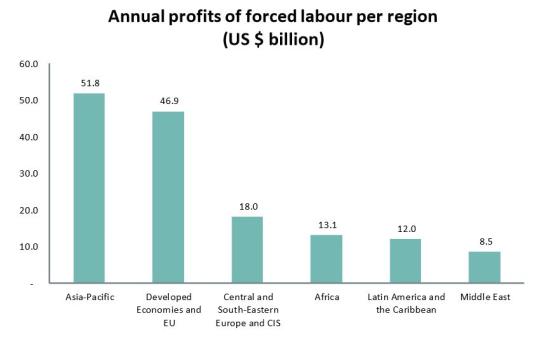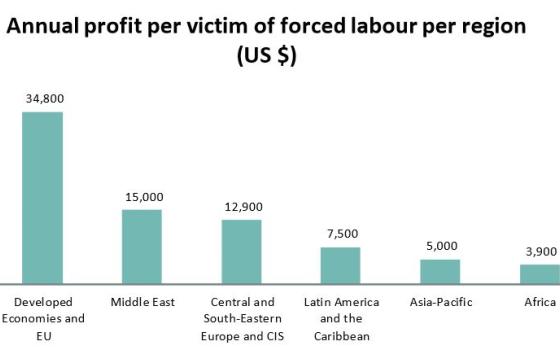This week Global Sisters Report featured a story about Maryknoll Sister Helene O’Sullivan’s work with women in Cambodia who have been trafficked, empowering them through education.
Human trafficking is a global reality with a local face. We may think that it doesn’t happen where we live. We think of people being bound, beaten and transported across international boundaries. But it is often much more subtle. As Sr. Ann Oestreich pointed out in this week’s A Nun’s Life podcast, it is “hidden in plain sight.” In fact, it is part of our daily lives. Exploitation is used in the supply chains for our food, clothes, electronics and other consumer goods.
Human trafficking involves force, fraud or coercion. It may or may not involve movement of the victim. It is forced labor or forced sexual exploitation. In the case of minors, the use of force, fraud or coercion is irrelevant to sexual exploitation. It is called modern day slavery.
Each year since the passage of the Trafficking Victims Protection Act in 2000, the U.S. State Department issues a report, assessing the progress being made globally in combating trafficking. The report ranks countries into three tiers based upon their efforts to comply with the minimum standards of the Act; it also contains country narratives and identifies best practices and vulnerable populations. The 2014 Trafficking in Persons Report, which was issued on June 20, emphasizes the importance of basing efforts against human trafficking on the experience of survivors. It also points out the connection between poverty, environmental degradation and human trafficking.
Modern day slavery is a lucrative business. Profits from the use of forced labor in the private sector amount to $150 billion per year, according to the 2014 International Labor Organization Report, “Profits and Poverty: The Economics of Forced Labour.” A majority of the profits are generated in the Asian region but the per capita amounts are highest in the developed economies. Two-thirds of the profit is from commercial sexual exploitation. Aside from that, the sectors of most concern are agriculture, including fishing and forestry, construction, manufacturing, mining, utilities and domestic work. According to the report, about 55 per cent of all victims are women and girls. In commercial sexual exploitation and in domestic work, the vast majority of victims are women and girls. Research shows a clear correlation between household vulnerability to sudden income shocks and the likelihood of ending up in forced labor.
Women religious around the globe have been involved with anti-trafficking work for decades. They are rescuing, protecting and sheltering victims. Through educational and entrepreneurial programs, they are empowering women and helping them find their way out of poverty. They are advocating for legislation. They are pressing corporations for changes in policies and presenting shareholder resolutions. They are educating others about human trafficking and starting campaigns to curb the demand. They are asking hotels to sign ECPAT’s Code of Conduct for the tourism industry before booking meetings. They are serving on governmental commissions and task forces.
In all this, women religious are involved in forming coalitions and collaborating with a wide variety of people. Important groundbreaking work against human trafficking is being done with a comprehensive approach: involving governmental officials, law enforcement personnel, educators, social service agencies and survivors themselves.
To coordinate and intensify their efforts, women religious have created networks among themselves. The International Union of Superior Generals established Talitha Kum, an international network with 22 member networks in 75 countries.
In the U.S., women religious active in anti-trafficking efforts have linked to form U.S. Catholic Sisters Against Human Trafficking. The website of the Bakhita Initiative is one source for information about their activities. The Sisters of the Divine Savior have been publishing a monthly newsletter Stop Trafficking! since 2003. Presently 70 congregations of women religious are co-sponsors. It is a great source of up-to-date information, resources and suggestions for advocacy.
Global Sisters Report will be featuring additional stories about the work of women religious in combating human trafficking.
Other resources:
The Polaris Project: A U.S. based organization that operates the National Human Trafficking Hotline 1-888-373-7888 or text BeFree (233733), tracks trends and provides resources, maps and information about pending legislation on a state-by-state basis.
The Coalition of Catholic Organizations Against Human Trafficking (U.S.)
The Slavery Footprint: Discover your connection with modern day slavery using this interactive survey.
[Jan Cebula, OSF, is liaison to women religious in the United States for Global Sisters Report.]

